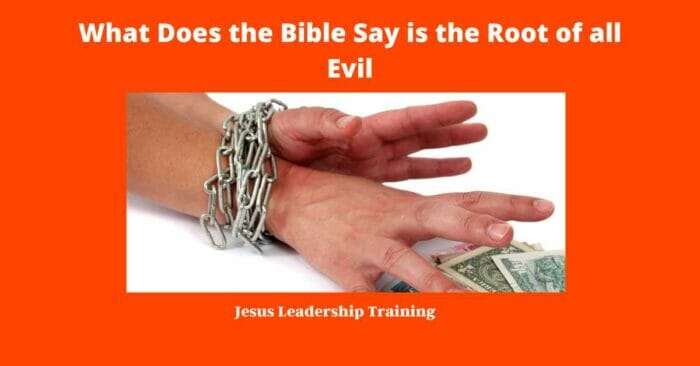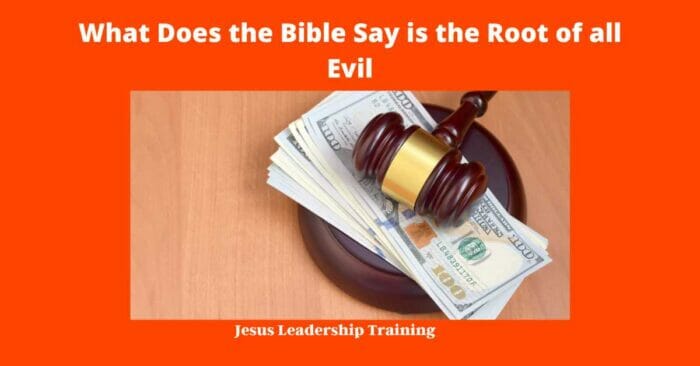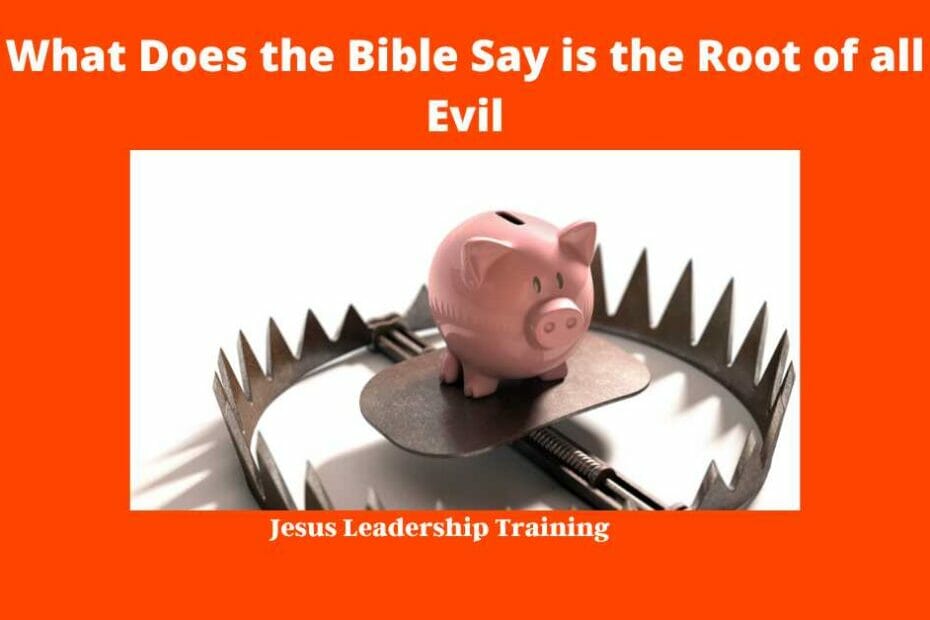Does the Bible say Money is the Root of All Evil – The Bible states that the root of all evil is the love of money. In 1 Timothy 6:10, it says, “For the love of money is a root of all kinds of evil. Some people, eager for money, have wandered from the faith and pierced themselves with many griefs.” This verse reveals that when people focus too much on the pursuit of money, they can become disconnected from their faith and experience a lot of pain in the process. This is why the Bible tells us to be wary of the love of money, as it can lead to many forms of evil.
Table of Contents
Does the Bible say Money is the Root of All Evil
What does the Bible say is the root of all evil? This is a question that has been asked for centuries by people who want to know more about the teachings of Christianity and how it applies to their lives. The Bible does not specifically say what is the root of all evil, but it does provide guidance on how to live a life that is pleasing to God. In this blog, we will discuss the impact of money and greed in the Bible, the transitory nature of money, what the Bible says about the love of money, the power of evil in the Bible, biblical verses about overcoming evil, the biblical definition of evil, how does the Bible describe the origin of evil, and what are God’s desires of how we use our money.
10 Steps and Description we can Teach our Children to Avoid the Love of Money
The love of money is a powerful thing. It can consume us and take us to places we never thought possible. It can make us do things we never thought we would do. It can also tear families apart and ruin relationships. That’s why it is so important to teach our children how to avoid the love of money. Here are 10 steps and descriptions we can teach our children to avoid the love of money.

- Teach your children to appreciate the value of money. Money is a tool that can be used to buy things we need, so it is important to understand its value. Teach your children the difference between wants and needs, and how to make wise decisions when spending money.
- Instill a sense of responsibility in your children. Let them know that earning and managing money is a responsibility and that it should not be taken lightly. Talk to them about budgeting, saving, investing and the importance of being financially responsible.
- Talk to your children about the dangers of debt. Explain to them how debt can quickly become overwhelming and lead to financial ruin. Let them know that it is important to live within their means and avoid taking on too much debt.
- Show your children the importance of giving. Teaching your children to be generous and to give to those in need will help them to appreciate the value of money and realize that it is not the only thing that matters in life.
- Encourage your children to find ways to make money. This will help them understand the importance of work and the value of money. It will also help them to appreciate the hard work that goes into earning money.
- Help your children to set financial goals. This will give them something to strive for and will teach them the importance of planning ahead and working towards a goal.
- Talk to your children about the importance of saving. Teach them the value of saving for a rainy day and for their future. Help them to set up a savings account and a budget so they can get in the habit of saving.
- Teach your children to be patient. Instill in them the importance of patience and the value of delayed gratification. This will help them to avoid making impulsive decisions when it comes to money.
- Help your children to develop a positive attitude towards money. Let them know that money is not the only thing that matters in life and that it should not be the focus of their life.
- Model good financial habits and behaviors. Your children will learn a lot from observing your behavior and your attitude towards money. Make sure you are setting a good example by living within your means and avoiding the love of money.
By teaching your children these 10 steps and descriptions regarding money, you can help them to avoid the love of money. Money is a powerful thing but it should not be the focus of our lives. Help your children to understand its true value and to appreciate the importance of other things in life.

The Impact of Money and Greed in the Bible
The Bible does not say that money is evil in itself. In fact, it teaches that money can be used for good purposes and can be a blessing. However, the Bible does discuss the dangers of money and greed. In Luke 16:13, Jesus warns, “No servant can serve two masters. Either he will hate the one and love the other, or he will be devoted to the one and despise the other. You cannot serve both God and Money.” This verse shows that money should not be the focus of our lives. We should serve God above anything else.
The Bible also mentions the danger of greed in 1 Timothy 6:10, which says, “For the love of money is the root of all evil.” This verse shows that the love of money can lead to evil and corrupt behavior. Greed can cause envy, pride, and other sinful attitudes and actions.
Dangers of Greed
Greed has long been known as a sin and is one of the seven deadly sins. Greed is an unhealthy desire to acquire more wealth than what a person needs. It is an excessive pursuit of material possessions and power, and it can have devastating effects on a person’s life, as well as their relationships with others.
Greed can cause people to make decisions that are not in their best interest. People may choose to take risks that they might not take if they were not so greedy. These risks could include taking on too much debt, investing in something that is not sound, or trying to make a quick buck when the odds are against them. Greed can also lead to unethical behavior, as people may be willing to do whatever it takes to make more money, regardless of the consequences.
Greed can also lead to isolation. Greed can make people so focused on getting more that they forget to appreciate what they already have. They may neglect their relationships and isolate themselves from friends and family. This isolation can lead to depression and other mental health issues.
Greed can also affect a person’s physical health. People who are driven by greed may be more likely to engage in unhealthy behaviors, such as overeating, smoking, and drinking. These behaviors can lead to serious health problems, such as heart disease and cancer.
Greed can also lead to financial troubles. People may be willing to take on more debt than they can handle in order to get what they want. This can lead to crushing debt and even bankruptcy.
Finally, greed can lead to criminal behavior. People may be willing to commit fraud, larceny, or other crimes in order to get what they want. This can have serious consequences, including incarceration and loss of reputation.
Greed is a dangerous emotion and can have a devastating impact on a person’s life. It can lead to poor decision-making, isolation, physical and mental health issues, financial troubles, and even criminal behavior. It is important to recognize the signs of greed and take steps to control it. Taking time to appreciate what you have and focusing on meaningful relationships can help to prevent greed from taking over.

What Did Jesus Teach about Money
Money is a topic that everyone encounters on a daily basis, and Jesus had a lot to say about it. Throughout the Gospels, Jesus has numerous teachings on money and how to manage it. In the Bible, Jesus used money as a tool to teach his disciples about the power of giving, the importance of trusting God, and the dangers of greed. In this blog post, we will look at the teachings of Jesus on money and how they can be applied to modern life.
First, Jesus taught his disciples about the power of giving. He said, “Give, and it will be given to you. A good measure, pressed down, shaken together and running over, will be poured into your lap. For with the measure you use, it will be measured to you.” (Luke 6:38). In this teaching, Jesus is telling his followers that when we give to others, God will bless us in return. He is encouraging us to be generous with our resources and to give freely to those in need.
Second, Jesus taught his followers about the importance of trusting God with our finances. He said, “Do not worry, saying, ‘What shall we eat?’ or ‘What shall we drink?’ or ‘What shall we wear?’ For the pagans run after all these things, and your heavenly Father knows that you need them.” (Matthew 6:31-32). In this teaching, Jesus is telling us not to worry about our finances because God will provide for us. He is reminding us to trust that God will meet all of our needs and that we don’t need to worry about money.
Finally, Jesus taught his disciples about the dangers of greed. He said, “No one can serve two masters. Either he will hate the one and love the other, or he will be devoted to the one and despise the other. You cannot serve both God and Money.” (Matthew 6:24). In this teaching, Jesus is warning us not to put our trust in wealth and material possessions. He is reminding us that these things are fleeting and that we should instead put our trust in God.
Overall, Jesus had many teachings on money and how to manage it. He taught us the power of giving, the importance of trusting God, and the dangers of greed. As we strive to live out Jesus’ teachings, we should remember to be generous with our resources, to trust God with our finances, and to avoid the temptation of greed. By following Jesus’ teachings on money, we can live lives of abundance and joy.

Transitory Nature of Money
The Bible also emphasizes the transitory nature of money. In Matthew 6:19-20, Jesus says, “Do not store up for yourselves treasures on earth, where moths and vermin destroy, and where thieves break in and steal. But store up for yourselves treasures in heaven, where moths and vermin do not destroy, and where thieves do not break in and steal.” This passage shows that money is not eternal and can be taken away at any time. Thus, it is important to focus on the things that will last forever, such as our relationship with God.
What the Bible Says About the Love of Money
The Bible does not say that money is evil in itself, but it does warn against the love of money. In 1 Timothy 6:10, Paul says, “For the love of money is the root of all kinds of evil.” This verse shows that greed and a desire for wealth can lead to many different types of evil behavior. Greed can cause envy, pride, and other sinful attitudes and actions.
The Power of Evil in the Bible
The Bible also discusses the power of evil. In 1 Corinthians 10:13, it says, “No temptation has overtaken you except what is common to mankind. And God is faithful; he will not let you be tempted beyond what you can bear. But when you are tempted, he will also provide a way out so that you can endure it.” This verse shows that evil is powerful and can be very tempting. However, God will always provide us with a way out.
Biblical Verses About Overcoming Evil
The Bible also provides guidance on how to overcome evil. In Philippians 4:8, Paul says, “Finally, brothers and sisters, whatever is true, whatever is noble, whatever is right, whatever is pure, whatever is lovely, whatever is admirable—if anything is excellent or praiseworthy—think about such things.” This verse teaches us to focus on the good and to avoid wickedness.
The Biblical Definition of Evil
The Bible does not provide a single definition of evil, but it does provide many examples of what evil is. In 1 John 3:4-5, it says, “Everyone who sins breaks the law; in fact, sin is lawlessness. But you know that he appeared so that he might take away our sins. And in him is no sin.” This passage shows that evil is disobedience to God’s law.

How Does the Bible Describe the Origin of Evil?
The Bible does not provide a definitive answer to the question of where evil comes from. However, it does provide some insight into the origin of evil. In Isaiah 45:7, God says, “I form the light and create darkness, I bring prosperity and create disaster; I, the Lord, do all these things.” This verse shows that God is ultimately in control of all things, including evil.
Paul did not write that money is Evil But
Although Paul did not write that money is evil, he did warn against the love of money. In 1 Timothy 6:10, he says, “For the love of money is the root of all kinds of evil.” This verse shows that greed and a desire for wealth can lead to many different types of evil behavior.
How Does Satan Use the Love of Money tempt Christians
Satan uses the love of money to tempt Christians away from God. He does this by enticing them to focus on material wealth instead of spiritual riches. He also promotes greed and selfishness, which can lead to a breakdown of relationships and a lack of trust in God.
How can Children of God Resist the Temptation of Greed?
Children of God can resist the temptation of greed by following the teachings of Jesus and the Bible. They should focus on their relationship with God and be content with what they have. They should also remember the transitory nature of money and that it cannot buy happiness.
What are God’s Desires of how we use Our Money
God’s desires of how we use our money are outlined in the Bible. He desires that we use our money to support the church, help the poor, and invest in eternal things. He also desires that we not focus on material wealth, but instead focus on spiritual riches.

10 Ways we can Use Money That Leads to Greed
Greed is a powerful emotion, and it can cause us to make decisions that are not always in our best interest. Money is a powerful tool, and if we are not careful, it can lead us down a path of greed. Greed can be thought of as an insatiable desire for more and more. This can lead to unethical and harmful decisions, such as hoarding money, spending recklessly, and taking advantage of others.
Money is often seen as the root of all evil, but it doesn’t have to be. Money can be used in a positive way and lead to a better life. Here are 10 ways we can use money that lead to greed:
- Investing in the stock market: Investing in the stock market can be an incredibly lucrative endeavor, but it can also lead to greed if done recklessly. If you invest in stocks with the goal of getting rich quickly, you may be tempted to take risks you don’t understand and make decisions that are not in your best interest.
- Gambling: Gambling can be a fun and exciting way to use your money, but it can also lead to greed. When you’re in it for the thrill and the potential to win big, you’re more likely to take risks that you can’t afford to take and be overly optimistic about your chances of success.
- Impulse buying: Impulse buying is one of the most common ways we use money that leads to greed. When we see something we want, we often don’t think about the long-term implications of our purchase and how it will affect our finances.
- Taking on debt: Taking on debt is another way we use money that can lead to greed. When we don’t think about the long-term implications of our debt, we can be tempted to take on more than we can handle, which can lead to financial hardship down the road.
- Hoarding money: Hoarding money is a sign of greed, and it can be detrimental to your financial health. When you hoard money, you deprive yourself of the opportunity to invest it, save it, or use it to help others.
- Spending on luxury items: Luxury items can be enjoyable to own, but they can also be a sign of greed. If you’re spending more money on items that you don’t need than you are on things that will benefit you in the long-term, you’re probably being too greedy.
- Making risky investments: Making risky investments is another way we use money that can lead to greed. When we’re looking to get rich quickly, we may be tempted to take on more risk than we can handle, and this can lead to disastrous consequences.
- Neglecting to save for retirement: Saving for retirement is an important part of our financial health, but it can be easy to neglect when we’re focused on short-term gains. If you’re spending more money on things that don’t benefit you in the long-term, you’re probably being too greedy.
- Not giving to charity: Giving to charity is a great way to use your money, but it can also be a sign of greed if you’re not doing it for the right reasons. If you’re giving to charity to get a tax break or to make yourself feel better, you’re probably being too greedy.
- Taking advantage of others: Taking advantage of other people is a sure sign of greed, and it’s something that should be avoided at all costs. Whether it’s taking advantage of a business partner, exploiting a customer, or taking advantage of a family member, taking advantage of others is never a good use of money.
Money can be a powerful tool, but it can also lead to greed if we’re not careful. If you’re looking to use your money in a positive way, make sure that you’re being mindful of your decisions and taking the long-term into consideration. By doing so, you can avoid the pitfalls of greed and use your money to make a positive difference in your life.
10 Ways we can Use Money in a Godly Way
Money is an important part of our lives. Whether it’s for providing for our daily needs, or for investing in our future, it’s a necessary part of life. However, many of us forget that money should be used in a way that honors God. Money should not be a source of stress, but rather a resource that can be used to further God’s kingdom.
In this blog, we’ll look at 10 ways we can use money in a godly way. We’ll discuss giving to those in need, investing in our future, and using our resources to further God’s kingdom.
- Give to the Poor and Needy
One of the best ways to use money in a godly way is to give to the poor and needy. This can be done through donations to charities, volunteer work, or simply helping out a struggling friend or family member. By using our resources to help those in need, we are showing God’s love to those around us.
- Invest in Our Future
We should also use money to invest in our future. This can be done by saving for retirement, buying a home, or investing in business ventures. By investing our money wisely, we are setting ourselves up for long-term success and financial stability.
- Give to the Church
Giving to the church is another great way to use money in a godly way. The church relies on donations to keep its doors open and to fund its ministries. By donating to the church, we are supporting the work that God is doing in our community.
- Give to Missionaries
We can also use money to support missionaries. Missionaries are often sent out to spread the gospel and to help those in need. By donating to missionary causes, we are helping to further God’s kingdom and to make a difference in the lives of those around the world.
- Invest in Education
Investing in education is another great way to use money in a godly way. Education is essential for personal and professional growth, and it can open up a world of opportunities. Investing in education can be done by paying for college tuition, taking classes, or simply investing in books and resources that can help us grow and learn.
- Give to Charities
Giving to charities is another great way to use money in a godly way. There are countless charities around the world that are working to make a difference in people’s lives. By donating to charities, we are helping to support the work of those who are bringing positive change to the world.
- Invest in Others
We can also use money to invest in others. This can be done by helping a friend or family member start a business, investing in a small business, or simply lending a helping hand when needed. By investing in others, we are helping to create opportunities for those around us.
- Save for Emergencies
Saving for emergencies is also a great way to use money in a godly way. Emergencies can arise at any time, and it’s important to be prepared. By having a savings account set aside for emergencies, we are making sure that we are prepared for any unexpected expenses.
- Invest in Yourself
Finally, we should also use money to invest in ourselves. This can be done by taking care of our health, improving our skills, or simply taking time to relax and enjoy life. By investing in ourselves, we are making sure that we are able to live our lives in the best way possible.
- Give Generously
The last way we can use money in a godly way is to give generously. This means giving freely and without expectation of anything in return. By giving generously, we are showing God’s love to those around us and helping to further His kingdom.
These are just a few of the ways we can use money in a godly way. By using our money wisely and in a way that honors God, we can make a difference in our own lives and in the lives of those around us.
Best Bible Encyclopedias and Dictionaries
Below is a table featuring some highly regarded Bible Encyclopedias and Dictionaries along with their publishers and websites where they can be found or purchased.
| Title | Publisher | Website |
|---|---|---|
| The International Standard Bible Encyclopedia | Eerdmans | Eerdmans |
| Zondervan’s Pictorial Bible Dictionary | Zondervan | Zondervan |
| Easton’s Bible Dictionary | Thomas Nelson | Thomas Nelson |
| Holman Illustrated Bible Dictionary | B&H Publishing Group | B&H Publishing Group |
| The New Unger’s Bible Dictionary | Moody Publishers | Moody Publishers |
| HarperCollins Bible Dictionary | HarperOne | HarperOne |
| Vine’s Complete Expository Dictionary of Old and New Testament Words | Thomas Nelson | Thomas Nelson |
You can generally find these resources on the publishers’ websites, as well as other online book retailers such as Amazon or Christianbook. It’s always good practice to confirm availability and review additional details on the specific websites or other reliable online bookstores.
Final Thoughts – What Does the Bible say about the Root of all Evil
In this blog, we discussed what does the Bible say is the root of all evil. We discussed the impact of money and greed in the Bible, the transitory nature of money, what the Bible says about the love of money, the power of evil in the Bible, biblical verses about overcoming evil, the biblical definition of evil, how does the Bible describe the origin of evil, and what are God’s desires of how we use our money. We learned that money is not evil in itself, but that greed and the love of money can lead to many types of evil behavior. We also learned that God provides us with a way out of temptation, and He desires that we use our money to invest in eternal things.





